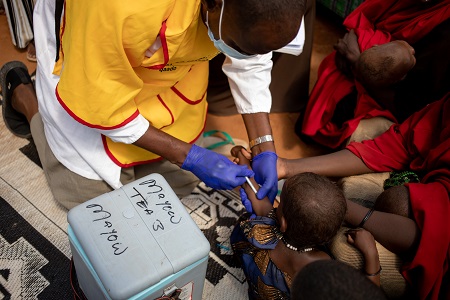 A skilled health worker vaccinates a child at a camp for the internally displaced persons in Kismayo. Credit : WHO Somalia/Arete
A skilled health worker vaccinates a child at a camp for the internally displaced persons in Kismayo. Credit : WHO Somalia/Arete
20 June 2022 – The promise of primary health care, and one of the main premises of universal health coverage is to promote good health for everyone, everywhere, including during dire health emergencies. In Somalia, the World Health Organization (WHO) is leveraging its response to the ongoing drought, the worst of its kind in 4 decades, to build back better. This means building more efficient health systems that reach more and more people equitably, delivering timely services without putting anyone through further financial hardship.
Setting up outreach vaccination sites to access communities in need
After noting the limited uptake of COVID-19 vaccination in health facilities across the country, WHO, the United Nations Children’s Fund (UNICEF) and partners supported the federal and state health ministries to set up outreach vaccination sites in the country. These sites aim to take services to the people, especially those who do not visit the health centres, to accelerate vaccination in order to protect more people from diseases in Somalia.
Building on the success of this intervention, WHO supported the same strategy to vaccinate children against common childhood diseases and childbearing women against tetanus. Children receive vaccines to shield them from childhood tuberculosis; diphtheria, tetanus, and pertussis (DTP); polio; hepatitis B; haemophilus influenzae type B; and measles. Additionally, outreach teams provide vitamin A, oral rehydration salts, tetanus vaccination, and consultation with required medication to communities.
Children who have never received vaccines before are benefiting
Since the onset of the drought last year, through 239 outreach sessions conducted per week in 35 districts, more than 11 000 children with diarrhoeal disease have been treated with oral rehydration salts and zinc.
Consultations at the outreach services have benefited 39 412 people aged over 5 years and 38 068 children under 5 so far. Over 29 000 zero-dose children have been identified, and received their first vaccines, and over 52 000 children have been vaccinated against measles through these outreach services being offered to marginalized communities and those living in hard-to-reach areas.
As the COVID-19 pandemic has already had a negative effect on routine childhood immunization, integrated outreach sessions have significantly boosted immunity in children who would have otherwise missed the chance to get protected against diseases. By reaching out to communities, including vulnerable ones during the ongoing drought, Somalia is taking steady steps towards delivering on its promise to offer essential health services to all.
 A skilled health worker vaccinates a child at a camp for the internally displaced persons in Kismayo. Credit : WHO Somalia/Arete
A skilled health worker vaccinates a child at a camp for the internally displaced persons in Kismayo. Credit : WHO Somalia/Arete
20 June 2022 – The promise of primary health care, and one of the main premises of universal health coverage is to promote good health for everyone, everywhere, including during dire health emergencies. In Somalia, the World Health Organization (WHO) is leveraging its response to the ongoing drought, the worst of its kind in 4 decades, to build back better. This means building more efficient health systems that reach more and more people equitably, delivering timely services without putting anyone through further financial hardship.
Setting up outreach vaccination sites to access communities in need
After noting the limited uptake of COVID-19 vaccination in health facilities across the country, WHO, the United Nations Children’s Fund (UNICEF) and partners supported the federal and state health ministries to set up outreach vaccination sites in the country. These sites aim to take services to the people, especially those who do not visit the health centres, to accelerate vaccination in order to protect more people from diseases in Somalia.
Building on the success of this intervention, WHO supported the same strategy to vaccinate children against common childhood diseases and childbearing women against tetanus. Children receive vaccines to shield them from childhood tuberculosis; diphtheria, tetanus, and pertussis (DTP); polio; hepatitis B; haemophilus influenzae type B; and measles. Additionally, outreach teams provide vitamin A, oral rehydration salts, tetanus vaccination, and consultation with required medication to communities.
Children who have never received vaccines before are benefiting
Since the onset of the drought last year, through 239 outreach sessions conducted per week in 35 districts, more than 11 000 children with diarrhoeal disease have been treated with oral rehydration salts and zinc.
Consultations at the outreach services have benefited 39 412 people aged over 5 years and 38 068 children under 5 so far. Over 29 000 zero-dose children have been identified, and received their first vaccines, and over 52 000 children have been vaccinated against measles through these outreach services being offered to marginalized communities and those living in hard-to-reach areas.
As the COVID-19 pandemic has already had a negative effect on routine childhood immunization, integrated outreach sessions have significantly boosted immunity in children who would have otherwise missed the chance to get protected against diseases. By reaching out to communities, including vulnerable ones during the ongoing drought, Somalia is taking steady steps towards delivering on its promise to offer essential health services to all.
 A skilled health worker vaccinates a child at a camp for the internally displaced persons in Kismayo. Credit : WHO Somalia/Arete
A skilled health worker vaccinates a child at a camp for the internally displaced persons in Kismayo. Credit : WHO Somalia/Arete








